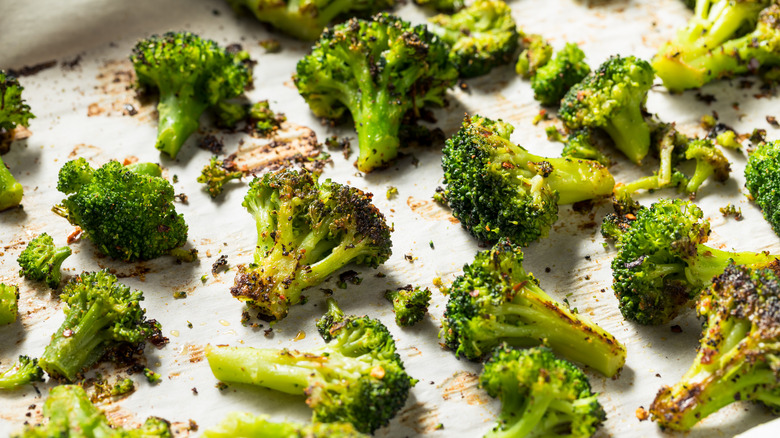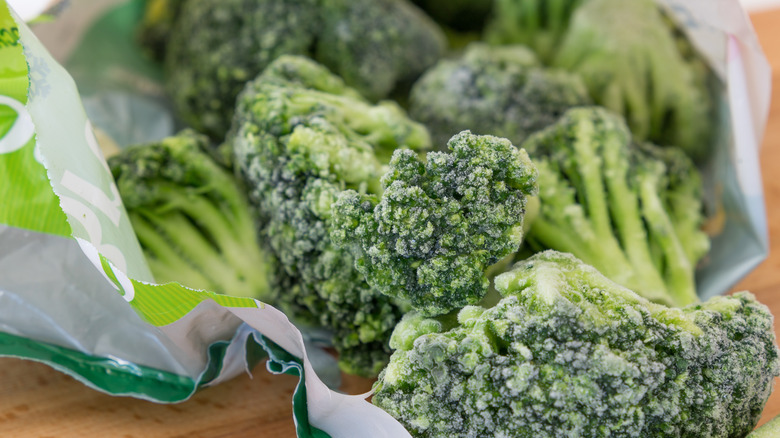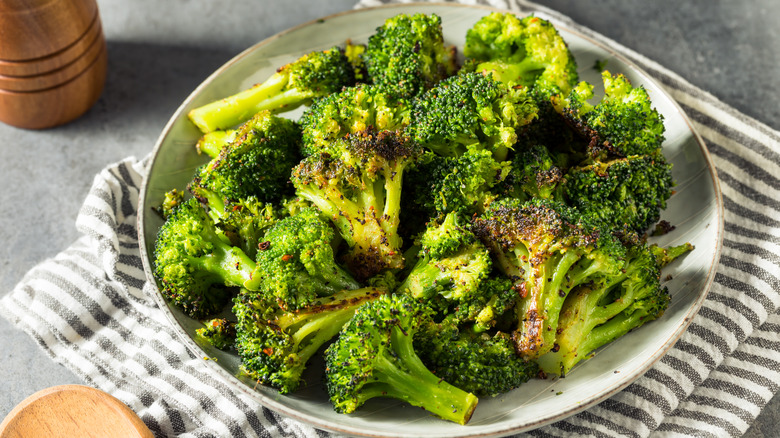The Oil Mistake You Want To Avoid When Roasting Frozen Broccoli
Frozen broccoli is a freezer staple. It's quick, easy to prepare, and boasts the same level of nutrients as fresh broccoli. But many of those frozen broccoli packages suggest steaming it as the best cooking method — and while efficient, it certainly doesn't give you that crispy texture you might be looking for. The good news is you can roast your frozen vegetables, too, including broccoli — but the method differs slightly from the fresh variety; the biggest mistake to avoid is tossing it in oil right away.
Unlike fresh broccoli, frozen broccoli has a lot of extra water that needs to be removed in order for the broccoli to roast properly. Since the heat needs to go to work removing the water from the vegetable, coating it in oil could inhibit this process. The oil would essentially trap the water, leaving your broccoli less than crispy. Next time you roast it from frozen, give that water a chance to evaporate by avoiding any oil for the first part of the cooking process.
Don't add oil to frozen broccoli right away
To properly roast frozen broccoli, start by placing a wire rack over a baking sheet, then add the broccoli directly onto the rack. This will help the water evaporate on all sides. (Remember not to add any oil.) You can add a little salt if desired, which will help draw the water out. Roast it as you normally would (somewhere around 400 degrees Fahrenheit), and let the broccoli start to brown.
Once it's browning and there is no water remaining, remove the broccoli and add some oil and seasonings. At this point, you can remove the wire rack, add parchment paper to the baking sheet to prevent the broccoli from sticking, and then place the broccoli directly onto the parchment-lined sheet. Pop it back in the oven until broccoli's exterior is browned and crisp; depending on your oven, the timing will vary.
The oil will help the broccoli get crispy as the cooking process finishes. It couples with the sugars in the broccoli to help caramelize the veggies' exterior, adding flavor and color to your dish. When roasting broccoli, you want to use an oil that's light but still has flavor, such as olive oil. If you're roasting at a low temperature, you can use coconut oil, but keep in mind that its smoke point is only 350 degrees Fahrenheit, so you'll have to roast low and slow.
How to enhance roasted frozen broccoli
Outside of following this roasting method, there are other ways to boost your frozen broccoli's flavor. Seasonings are your friend here; salt not only draws out the water but also brings out the broccoli's flavor. Spices like garlic powder and paprika are a great way to add additional flavor, too. You can brighten up the dish by adding some lemon juice to frozen broccoli. For added spice, Cajun seasoning or chili powder will do the trick. You can even toss the broccoli in flavored olive oil, such as one that's been infused with roasted garlic, to impart even more taste.
If you find you have leftover roasted broccoli, you can reheat it in the oven — just set the oven to 350 degrees Fahrenheit, and let it warm (you don't want to re-roast it and risk burning it). Popping it in the air fryer for just a few minutes is a great option, too, but avoid microwaving the broccoli as it could become too soft.


